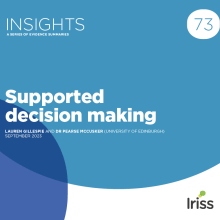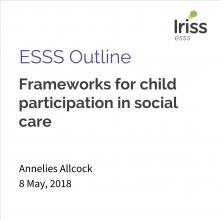Summary of research
There is a growing discourse that explores the complexity of decision making, with a greater appreciation of the many factors that can impact judgement, decisions and outcomes. Case reviews and traditional literature focused on flawed assessments and decisions, result in guidance to minimise errors that impact on the lives of people we work with (Munro, 2011). Social work literature has more broadly explored how we think and the factors that impact on our assessments, judgements and decisions (Baumann and colleagues; 2011; Helm, 2011; Taylor, 2012). Supervision is repeatedly noted as central to assessment, with critical thinking and objective questioning being viewed as a means to reduce bias and flawed decisions (Ruch, 2007; Munro, 2008).
Despite the prevalence of discussion surrounding supervision and consequently a manager’s role in decision making, there is little consideration of this unique perspective of decision making. This study aims to explore this role, specifically exploring how managers in child welfare and protection services often make ‘blind' decisions about children and families they have not met, based on information that is provided by other workers.
The findings are based on seven semi-structured interviews with first line managers in child welfare and protection services in two Scottish local authorities. Interviews explored the context and process of blind decision making, including the factors that impact confident blind decisions and how this may differ from decisions that are made following direct contact with a child and/or a family. Data has been analysed from an iterative and thematic approach, and themes generated to consider the links with the contemporary understanding of decision making in social work practice.
Findings highlight the nature and context of blind decision making and show the impact of relationship, trust and communication in managers’ decision making, including the complex dynamic of ownership in joint decision making. It also summaries the benefits and complications that come with managers having direct contact with children and families. The findings are presented with consideration of the potential implications for practice, policy and further research.
Completed: April 2019
About the author
Rebecca Hooton is an Australian who came to Scotland for a working holiday ten years ago and never left. She qualified in 2005 having studied a Bachelor of Social Work at The University of Sydney, and worked in community mental health in Sydney for five years before moving to Scotland. Since 2011 Rebecca has worked for Midlothian Council in Children Services as a social worker, team leader and now service manager. During this time she has developed an interest in how we make decisions in practice. This curiosity increased as she began her Masters in Applied Professional Studies (Child Welfare and Protection) at the University of Stirling. Rebecca's interest in research is always related to how this can be applied in practice to improve decision making and ultimately the outcomes for those she works with.
Copyright © 2019 Rebecca Hooton. All rights reserved. The author has given permission for this work to be downloaded and shared in the attached format for educational purposes only. For other permissions, please contact the author.
Contact email: rebecca.hooton@midlothian.gov.uk


